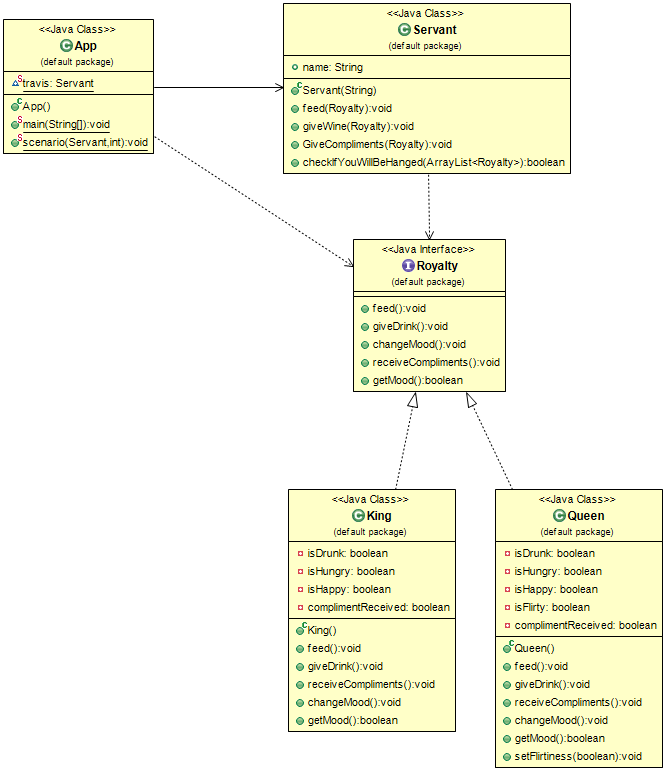Servant
Intent
Servant is used for providing some behavior to a group of classes.
Instead of defining that behavior in each class - or when we cannot factor out
this behavior in the common parent class - it is defined once in the Servant.
Explanation
Real-world example
King, Queen, and other royal member of palace need servant to service them for feeding,
organizing drinks, and so on.
In plain words
Ensures one servant object to give some specific services for a group of serviced classes.
Wikipedia says
In software engineering, the servant pattern defines an object used to offer some functionality
to a group of classes without defining that functionality in each of them. A Servant is a class
whose instance (or even just class) provides methods that take care of a desired service, while
objects for which (or with whom) the servant does something, are taken as parameters.
Programmatic Example
Servant class which can give services to other royal members of palace.
/**
* Servant.
*/
public class Servant {
public String name;
/**
* Constructor.
*/
public Servant(String name) {
this.name = name;
}
public void feed(Royalty r) {
r.getFed();
}
public void giveWine(Royalty r) {
r.getDrink();
}
public void giveCompliments(Royalty r) {
r.receiveCompliments();
}
/**
* Check if we will be hanged.
*/
public boolean checkIfYouWillBeHanged(List<Royalty> tableGuests) {
return tableGuests.stream().allMatch(Royalty::getMood);
}
}
Royalty is an interface. It is implemented by King, and Queen classes to get services from servant.
interface Royalty {
void getFed();
void getDrink();
void changeMood();
void receiveCompliments();
boolean getMood();
}
King, class is implementing Royalty interface.
public class King implements Royalty {
private boolean isDrunk;
private boolean isHungry = true;
private boolean isHappy;
private boolean complimentReceived;
@Override
public void getFed() {
isHungry = false;
}
@Override
public void getDrink() {
isDrunk = true;
}
public void receiveCompliments() {
complimentReceived = true;
}
@Override
public void changeMood() {
if (!isHungry && isDrunk) {
isHappy = true;
}
if (complimentReceived) {
isHappy = false;
}
}
@Override
public boolean getMood() {
return isHappy;
}
}
Queen, class is implementing Royalty interface.
public class Queen implements Royalty {
private boolean isDrunk = true;
private boolean isHungry;
private boolean isHappy;
private boolean isFlirty = true;
private boolean complimentReceived;
@Override
public void getFed() {
isHungry = false;
}
@Override
public void getDrink() {
isDrunk = true;
}
public void receiveCompliments() {
complimentReceived = true;
}
@Override
public void changeMood() {
if (complimentReceived && isFlirty && isDrunk && !isHungry) {
isHappy = true;
}
}
@Override
public boolean getMood() {
return isHappy;
}
public void setFlirtiness(boolean f) {
this.isFlirty = f;
}
}
Then in order to use:
public class App {
private static final Servant jenkins = new Servant("Jenkins");
private static final Servant travis = new Servant("Travis");
/**
* Program entry point.
*/
public static void main(String[] args) {
scenario(jenkins, 1);
scenario(travis, 0);
}
/**
* Can add a List with enum Actions for variable scenarios.
*/
public static void scenario(Servant servant, int compliment) {
var k = new King();
var q = new Queen();
var guests = List.of(k, q);
// feed
servant.feed(k);
servant.feed(q);
// serve drinks
servant.giveWine(k);
servant.giveWine(q);
// compliment
servant.giveCompliments(guests.get(compliment));
// outcome of the night
guests.forEach(Royalty::changeMood);
// check your luck
if (servant.checkIfYouWillBeHanged(guests)) {
LOGGER.info("{} will live another day", servant.name);
} else {
LOGGER.info("Poor {}. His days are numbered", servant.name);
}
}
}
The console output
Jenkins will live another day
Poor Travis. His days are numbered
Class diagram

Applicability
Use the Servant pattern when
- When we want some objects to perform a common action and don't want to define this action as a method in every class.